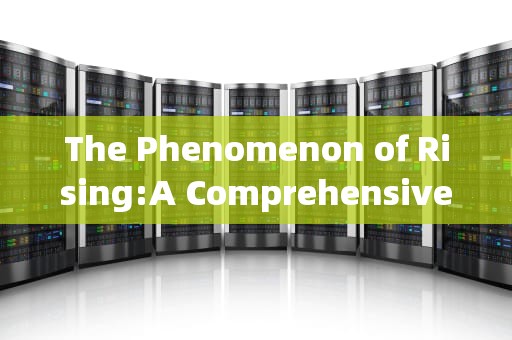本文目录导读:

In the ever-evolving landscape of human progress, the phenomenon of "rising" stands out as a multifaceted concept that permeates every aspect of our lives. From economic growth to cultural transformation, the idea of rising encapsulates a continuous upward trajectory, not just in status but also in significance and influence. This article delves into the intricate nuances of "rising," exploring its historical roots, cultural dimensions, and contemporary implications.
The concept of "rising" has ancient roots, reflecting humanity's unquenchable desire for progress and advancement. In historical terms, a "rising" society is characterized by the gradual enhancement of its standard of living, technological innovation, and social development. For instance, the Industrial Revolution marked a significant "rising" in industrial nations, leading to technological marvels and economic prosperity. Similarly, the Renaissance period was a time of cultural "rising," with the rebirth of art, literature, and philosophy, challenging traditional norms and fostering intellectual growth.
Throughout history, the idea of "rising" has often been associated with revolutions and transformations. The French Revolution, for example, symbolized a "rising" from a feudal society to a more democratic and equitable system. This transformation not only reshaped political structures but also influenced social and economic landscapes. In this sense, "rising" is not merely a static state but a dynamic process of evolution and adaptation.
Cultural "rising" refers to the emergence and growth of new cultural forms, values, and identities. This phenomenon is particularly evident in the globalized world of today, where cultural exchange and blending are加速ing. The rise of new cultural movements, such as environmentalism, feminism, and digital culture, reflects a deeper human desire for meaning and relevance in an increasingly complex world.
In many cultures, the concept of "rising" is tied to the idea of individual and collective self-expression. For example, the rise of social media platforms has enabled people to express their identities and values in new ways, fostering a sense of global connectivity and shared human experience. Moreover, the cultural "rising" of certain ideas, such as sustainability and inclusivity, signifies a broader shift towards more equitable and harmonious living.
Economic "rising" is one of the most visible aspects of this phenomenon, reflecting the growth and development of economies and markets. The rise of new industries, businesses, and financial systems has been a driving force behind economic progress. For instance, the rise of the information age has revolutionized the way we conduct business, access information, and create wealth. This economic "rising" has not only improved living standards but also transformed the global economy, leading to increased interdependence and competition.
The economic implications of "rising" are profound. It has enabled the emergence of new social classes, the expansion of opportunities, and the creation of new forms of wealth. Moreover, the economic "rising" has been a catalyst for technological innovation, which in turn has accelerated other forms of "rising," creating a vicious cycle of progress.
Social and political "rising" are closely intertwined with the broader concept of "rising." This dimension highlights the role of "rising" in shaping social structures, political systems, and ideologies. The rise of new political movements, such as movements for social justice, environmental sustainability, and democratic reforms, reflects a growing awareness of the need for collective action and self-determination.
The social and political "rising" has also been a catalyst for change, challenging traditional power structures and fostering new forms of governance. For example, the rise of grassroots movements and social media has empowered individuals to voice their concerns and influence policy-making. This has led to a redefinition of democracy and a greater emphasis on participatory governance.
In the contemporary era, the concept of "rising" continues to hold significant relevance. The rise of new technologies, such as artificial intelligence, big data, and the internet of things, represents a major "rising" in human capabilities and knowledge. These technological "rises" have transformed industries, reshaped work practices, and created new opportunities for growth and innovation.
Moreover, the contemporary "rising" is marked by a growing emphasis on sustainability, inclusivity, and ethical considerations. The rise of environmental sustainability movements, for instance, reflects a recognition of the need to balance economic progress with environmental preservation. Similarly, the rise of inclusive development models emphasizes the importance of addressing the needs of marginalized groups to achieve true societal progress.
In conclusion, the phenomenon of "rising" is a multifaceted concept that transcends time and space, reflecting humanity's unceasing quest for progress, self-expression, and interconnectedness. From its historical roots to its contemporary significance, "rising" serves as a testament to the resilience and creativity of the human spirit. As we navigate an ever-changing world, the concept of "rising" reminds us of the importance of continuous growth, adaptation, and innovation. By embracing the "rising," we can shape a future that is more inclusive, sustainable, and equitable for all.
随着互联网的普及和信息技术的飞速发展台湾vps云服务器邮件,电子邮件已经成为企业和个人日常沟通的重要工具。然而,传统的邮件服务在安全性、稳定性和可扩展性方面存在一定的局限性。为台湾vps云服务器邮件了满足用户对高效、安全、稳定的邮件服务的需求,台湾VPS云服务器邮件服务应运而生。本文将对台湾VPS云服务器邮件服务进行详细介绍,分析其优势和应用案例,并为用户提供如何选择合适的台湾VPS云服务器邮件服务的参考建议。

工作时间:8:00-18:00
电子邮件
1968656499@qq.com
扫码二维码
获取最新动态
